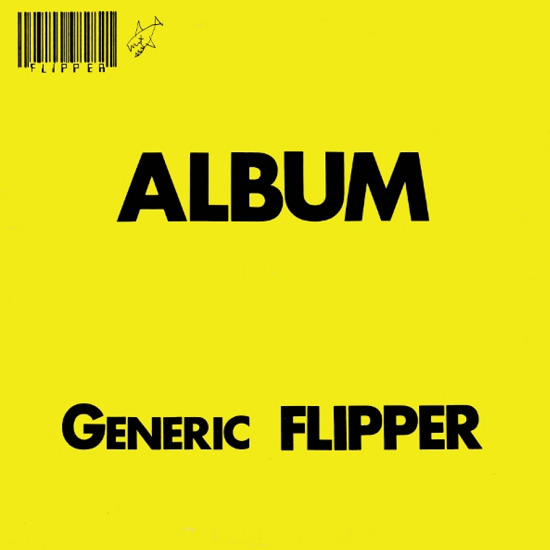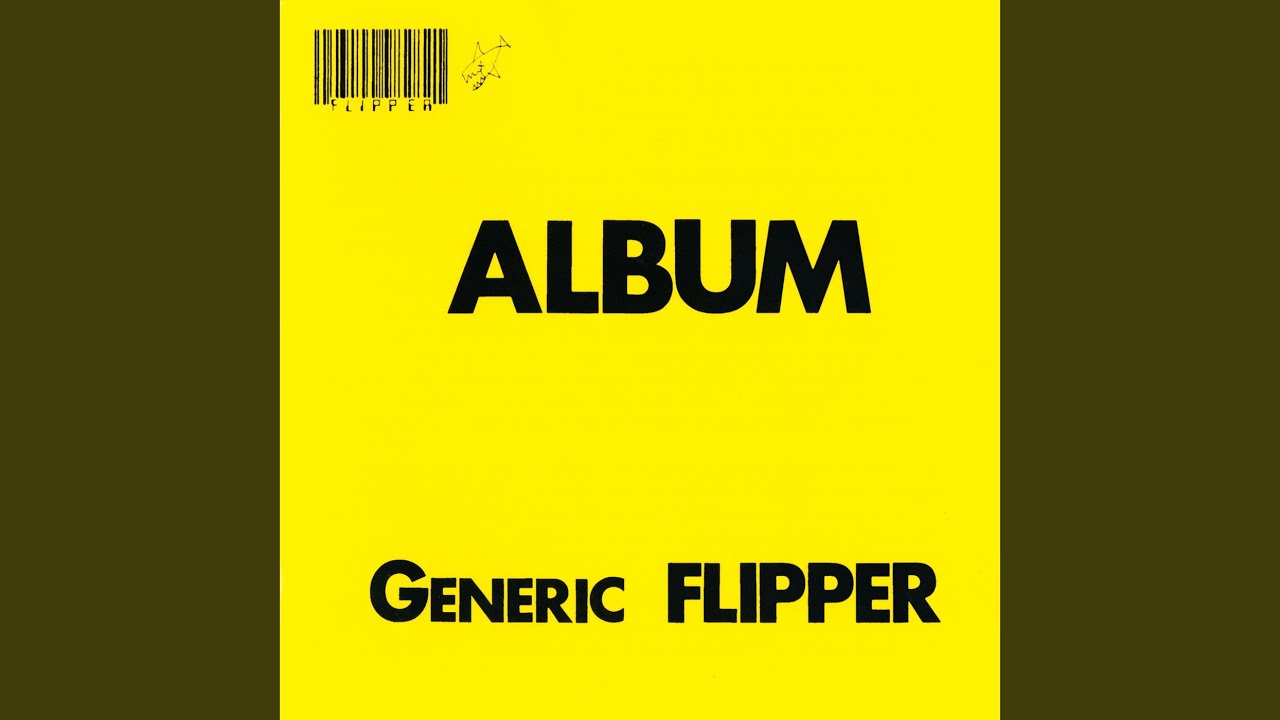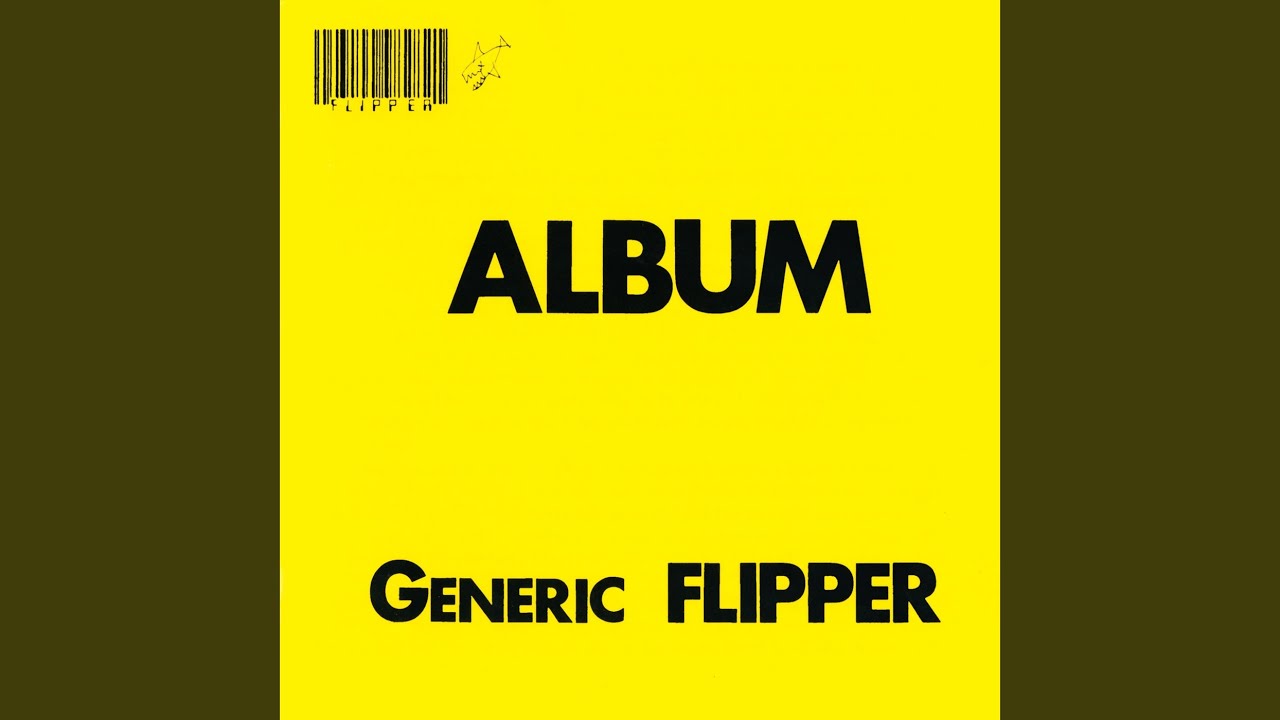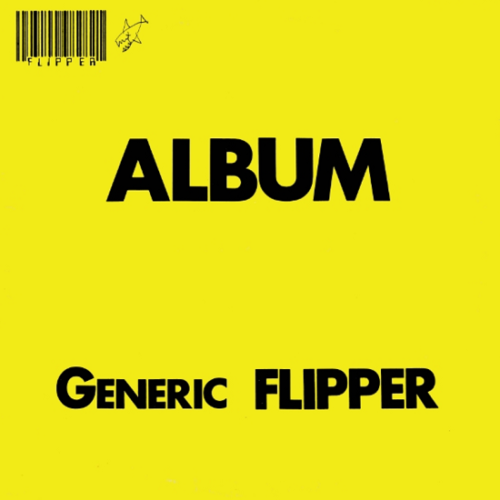“I fly into rages… And all out of boredom, gentlemen, all out of boredom; I am crushed with tedium. After all, the direct, immediate, legitimate fruit of heightened consciousness is inertia, that is, the deliberate refusal to do anything.”
Fyodor Dostoevsky – Notes From The Underground
“She has total faith in society. She’s so boisterous, always got too much energy… Hell, she’s even got aspirations.”
Izumi Suzuki –Terminal Boredom
With its bile yellow and barcode cover, Generic Flipper looks like a hazard warning, something you’d find on a barrel of day-glo waste from Mr. Burns’ nuclear power plant, sludge to be flushed out into Springfield lakes, now home to a mutant race of three-eyed fish.
Flipper were perhaps the first band out of punk’s ashes who lived up to the bleak promise of boredom forever. They upped the dejected ante – an inverse of punk frustration – and combined it with a sound that lags in sub-Sabbath tempos. Where Big Black took off on flights of high voltage frisson, Flipper sought caveman thud and mechanical oblivion.
Their music stands in opposition. It is a decade late response to San Franciscan free love. To pillage a line from The Fall – another group whose stance on the romantic tradition is search and destroy – the hippy flowers have wilted, revealed as funeral decorations of a drudge nation.
Despite jams that earned them the reputation of punk rock’s Grateful Dead, perhaps more natural forebears are Hawkwind, whose lengthy paens to cosmic dread (and atomic catastrophe) were memorably described by one time bassist Lemmy as “a black fucking nightmare”.
1982’s Album – Generic Flipper taps into pessimism as a carnivorous force, an (im)moral imperative. If punk’s early claims to boredom were a half-conscious shrug, this record is both deadly serious and a sardonic dare.
Here’s a taste of Flipper philosophy:
“Life is the only thing worth living for” – their downer stab at affirmation.
“I’ve got something better to do” – fat chance.
“Nothing’s only nothing and that’s not so new” – well, that’s more like it.
Life is cheap in the Flipper cosmos. Cheap but still a rip off. A ropey salesman in a crap suit whose car has no number plates.
San Francisco 1979, the formation of Flipper. A decade had passed in the capital of the counterculture since the summer of love. No matter. The city had at this stage a level of built in Bohemia, its promised-land charm and cheap rent still able to lure in young creatives with little in the way of funds. This was, of course, the city where Allen Ginsberg premiered Howl via the publishing wing of the City Lights Bookstore. The poem was his ecstatic eulogy to beat prose, poetry, saintly bikers, Zen Buddhism, angelheaded hipsters on the hunt for jazz and a quick fix. Its reverberations were felt throughout the counterculture while landing him a much publicised obscenity trial.
By the 1960s, Ken Kesey and his crew of Merry Pranksters were part of the Acid Tests soundtracked by house band The Grateful Dead, while Jefferson Airplane built up a cult following from residencies at The Matrix. Word of mouth and a bewildered national press bought swathes of young dropouts Westward to become part of the Haight-Ashbury community.
In her book, San Francisco And The Long 60s, Sarah Hill spoke to a number of key countercultural players. Kurt “Crowbar” Kangas recounts how “there were hundreds and hundreds of scenes going on in San Francisco. There was not just one scene; there were many of them. Every block had five communes on it and each one had 20 or 30 people in it. And that’s why every time you read about the Haight-Ashbury you’re going, ‘I didn’t see that.’ Well that was because there are many stories.”
Hill is keen to stress that as early as 1967 “many of the local bands, whose presence had long provided the soundtrack to the neighborhood, left the city and began to live rural lives across the Golden Gate Bridge in Marin County and further afield.”
“The Haight began to turn ugly,” Hill continues, “Those hippies still grasping at remnants of the dream in 1969 found themselves in a waking nightmare at the Altamont Speedway. That forward momentum established in the vital years 1965–66 had dissipated.”
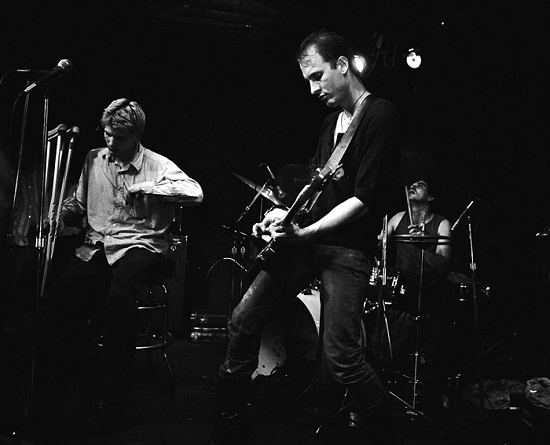
Photo: Wikimedia Commons
By the late 70s, the city was far from culturally barren however. For at time at least, San Francisco flew in the face of the modern notion that an influx of arty types would inevitably lead to an accumulation of cultural capital and, further down the line, gentrification. In the wake of punk, large buildings in varying states of disrepair became mini-epicentres for freak happenings, multimedia projects, budget Gesamtkunstwerks with a cabaret flair. Rather than a severing of the past, in many ways this cross pollination ethos continued to foster that 1960s spirit, where hippie communes, mime groups, political agitators, and tape music experimenters once co-existed at the fringes of the city.
Prior to punk’s landing there were already groups who outdid the typical sounds of the day. The Residents were a touring carnival of cultural detritus, beamed to us like pulp filth on graveyard transmissions. Chrome were late to the hippy party acid heads, but rather than be rehabilitated by punk, they doubled down on their mission, getting more kicks from oblivion than enlightenment, a dripping metal, psych punk sound indebted to the visionary author Philip K Dick.
These groups were capital A art projects, where Flipper leaned slightly more in the rock & roll camp, comprised of Vietnam vet Ted Falconi on guitar, ex Negative Trend bassist Will Shatter, Steve DePace on drums, and The Sleepers’ Ricky Williams on vocals – though he was booted prior to any official recordings, allegedly for being “too weird”.
Bar the Dead Kennedys, Flipper, of all the big San Francisco groups, most resembled punk; they were one of the few who could be moshed too, albeit in a kind of punch drunk pogo. It was the sound of someone with no muscle definition and busted equipment trying to bash out a punk tune. Music for those with nothing to do and no six pack to hand, the concrete blues of scrawny nihilists.
Flipper led with bass, the guitar used as slugging textural barrage. “I never got the guitar to do sax riffs”, Falconi told Guitar Site. “Guitar traditionally replaced the horn section when electricity came along… I like jet engines – there is a sonic element to what strings can do. Hendrix was the man – the first guy to play ‘electric guitar’ – not just amplified guitar.”
Their debut begins with a flurry of nihilist jabs. Now with Bruce ‘Loose’ Calderwood on vocals, ‘Ever’s scathing rhetorical questions direct both inwards and outwards. Some are misanthropic to the point of comedy – “Ever wish the human waste didn’t exist, then realise you’re one too?” – the kind of thing scribbled in the notebook of a teenager you want on firearm watchlists.
The album tracks them in pursuit of Zen doom, a life “full of zest but no appeal”. But these are no po-faced crew, it seems as if they take perverse pleasure out of such unyielding pessimism, a dour hedonist streak that pushes them towards a cult of extremity. Indeed, their live shows were acts of raucous antagonism, undercut with black humour and gross out pranks. One more extreme provocation involved almost a month’s worth of soiled diapers used as missiles against the crowd, their shows devolving into scatological warfare. “The audience tended to throw them right back at the band,” Calderwood told Simon Reynolds in his post punk tome Rip It Up And Start Again. “Our drummer, Steve DePace, got a dirty diaper in the face. The band thanked me a lot for that bright idea!”
Where exactly do Flipper lie in San Francisco’s musical ecology? Neither quite punk or fully fledged art band, they hold both terms in derision. ‘Life Is Cheap’ has garbled chipmunk vocals that recall The Residents, while the thrashier ‘Shed No Tears’ bludgeons like a rusty spanner in some low res slasher. They appear to have dual allegiance. Praising the city one moment. Deriding it the next. “There’s a lot of interesting creative people out there but it’s nice because it’s not competitive,” they told the radio station WNYU. “If you don’t want to do anything with your life you don’t have to. That’s why we’re there. Because we’re not doing anything with our lives.”
What they don’t have time for is right on liberalism, the proximity to Berkeley, the hippy hangover idealism. The Dead Kennedy’s Jello Biafra would later run for mayor, an unthinkable act of agit action in camp Flipper. “People still take The Clash seriously in San Francisco”, they bemoan. Derision and praise came right back at them. When asked how America took to Flipper, the answer was: “Better than we responded to them.”
The album culminates with ‘Sex Bomb’, which has the gnarled narcotic grind of latter day Fall in its eternal riff, but also this chugging, freight train funk. For no wavers on the East Coast, funk came out as lean and agitated, where the bass on ‘Sex Bomb’ has a legitimate James Brown oomph in its noisenik gurn, the title ‘Sex Bomb’ no doubt an ode to Brown’s immortal “sex machine” howl.
They’d follow up two years later with Gone Fishin’, the unsung, post punk Fun House. Not all were converted to its more experimental approach. Robert Christgau warned listeners to “watch out for bands who get heavily into texture and stop making jokes”.
Activity largely ceased for Flipper following the 1987 overdose and death of bassist Shatter. The rabidly avant garde scene of San Francisco – which produced the likes of Factrix and Tuxedomoon – had already perished. “Those who stayed in San Francisco found the music scene contracting and becoming less receptive to experimentation,” writes Simon Reynolds. “Hardcore punk, based more in the suburbs, began to dominate.”
1980s America was the decade where things brewed on the sidelines. Hip hop, the burgeoning sounds of house, techno and garage. For punk, too, new sounds spread, bastardised and lost in translation, much to the chagrin of meathead loyalists. Flipper straddled past and future. Harry Sword placed them as key figures of the reverse hardcore, drone continuum in his book Monolithic Undertow, an essential ingredient of later styles such as grunge and sludge metal. He said this of the group: “Flipper were a deeply antagonistic proposition… Predating both Black Flag and the Melvins in reversing punk’s tendency towards escape velocity tempos, Flipper would extend their set into sludgy jams (venues would often have to pull the plug), distorted, beer-soaked trance-inducing mantras.”
One of those groups was Nirvana. Kurt Cobain wore a homemade Flipper shirt on Saturday Night Live, and Generic Flipper landed a place on his top fifty albums of all time.
Indeed they would later be joined by Krist Novoselic on bass; that dopey Trump-supporting bloke who for years saw the animosity levelled at Dave ‘Nicest Guy in Rock’ Grohl, and thought, “Hold my Budweiser.”
1991 was famously dubbed ‘the year punk broke’, a release of pent up energy for the slacker nation, basement dwellers come out to strut their stuff, or, more likely, sway like punctured air dancers. The decade would see the flip side of the seductive boredom urge. We got endemic inertia and slacker indifference; the world of Bart Simpson, South Park, Beavis And Butthead. But rarely would any of this match the intensity of Flipper; their heroically doomed sound with boredom and energised apathy as its life force.

